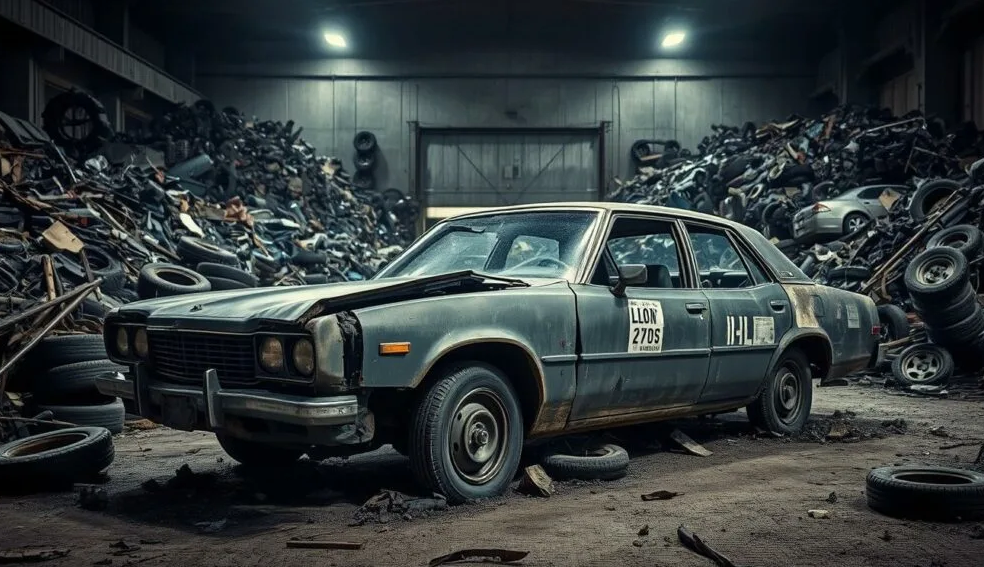
Eco-Friendly Car Scrapping in Sweden: A Sustainable Approach to Vehicle Recycling
In today’s environmentally conscious world, the way we dispose of vehicles has become just as important as how we use them. As cars reach the end of their functional life, scrapping and recycling them responsibly has become an essential part of minimizing our ecological footprint. Sweden is one of the leading nations in sustainable automotive practices, particularly in car scrapping and recycling.
This article delves into the eco-friendly car scrapping industry in Sweden, highlighting its regulatory framework, environmental benefits, and how platforms like Skrotbilarna are revolutionizing car recycling in Göteborg and nearby areas. We’ll explore the full lifecycle of a vehicle, from deregistration to dismantling, and how this process contributes to a cleaner, greener future.
The Growing Need for Eco-Friendly Car Scrapping
With advancements in vehicle technology and rising awareness of environmental concerns, older cars with inefficient engines and high emissions are being retired at a faster pace. In Sweden alone, thousands of vehicles are taken off the roads each year due to age, wear, or damage. But the method by which they are disposed of plays a critical role in environmental preservation.
Car scrapping is not simply about crushing and discarding an old vehicle; it’s about reclaiming usable materials, safely handling hazardous components, and reducing the strain on landfills. Sweden’s robust recycling infrastructure and strict environmental regulations have made it a model for other countries to follow.
Swedish Regulations on Vehicle Scrapping
The Swedish government has implemented a comprehensive framework that regulates how cars must be dismantled and recycled. These laws ensure that each part of the car is handled in an environmentally safe manner. The regulations are part of Sweden’s commitment to the European Union’s End-of-Life Vehicle (ELV) directive.
Key Elements of Sweden’s Vehicle Scrapping Law:
Mandatory Recycling: At least 95% of a vehicle’s weight must be recycled or recovered.
Certified Dismantlers: Only authorized facilities are allowed to handle vehicle dismantling.
Free Take-Back Policy: Car owners can scrap their vehicles without incurring high costs, encouraging proper disposal.
Hazardous Waste Management: Fluids like oil, brake fluid, and coolant must be safely removed and treated.
See also: The Importance of CNC Milled Parts in High-Precision Manufacturing
Skrotbilarna: Redefining Car Scrapping in Göteborg
Based in Göteborg, Skrotbilarna is a leader in sustainable car recycling. With a customer-first approach and a commitment to environmental protection, Skrotbilarna ensures that the entire vehicle scrapping process is seamless, compliant, and eco-friendly.
What Makes Skrotbilarna Stand Out:
Free Car Pickup: They offer a no-cost pickup service, making it convenient for car owners to dispose of vehicles.
Licensed Dismantling: All vehicles are dismantled at certified facilities that follow Sweden’s strict environmental laws.
Deregistration Support: Skrotbilarna handles the necessary paperwork for deregistering the car from the Transport Agency.
Eco-conscious Disposal: They maximize the recycling of every component, from batteries to body panels.
Their services make it easier for Göteborg residents and nearby communities to contribute to environmental sustainability.
The Car Scrapping Process: Step by Step
Recycling a car responsibly involves more than just towing it away. Let’s walk through the process to see what happens from the moment you decide to scrap your car:
1. Vehicle Pickup
Skrotbilarna arranges a convenient time for the car to be collected. Their fleet ensures quick service across Göteborg and surrounding areas.
2. Documentation and Deregistration
Before dismantling begins, the vehicle’s registration is canceled. Skrotbilarna ensures this is handled correctly through Sweden’s road traffic registry.
3. Dismantling at Authorized Facilities
Once at the dismantling station, fluids are drained, hazardous materials are neutralized, and usable parts are salvaged.
4. Material Sorting
Metals (steel, aluminum, copper), glass, rubber, and plastic are sorted for recycling. Each category follows a separate route for reuse or treatment.
5. Final Processing
Non-reusable remnants are either incinerated in waste-to-energy plants or processed for environmentally safe disposal.
Environmental Benefits of Car Scrapping
Car scrapping is a highly effective way to contribute to sustainability. Here’s how:
1. Reduces Landfill Waste
Cars are composed of thousands of components. When scrapped correctly, over 95% of these materials can be reused or recycled.
2. Saves Energy and Resources
Recycling steel and aluminum from vehicles uses significantly less energy than mining new metals. This conserves natural resources and reduces greenhouse gas emissions.
3. Minimizes Soil and Water Pollution
Fluids such as antifreeze and oil can contaminate soil and water if not disposed of properly. Certified dismantlers ensure these are handled according to strict protocols.
4. Encourages Green Innovation
By supporting car recycling industries, consumers and governments drive demand for new technologies in material recovery and reuse.
The Economic Impact of Car Recycling
In addition to environmental benefits, car scrapping also supports the local and national economy.
Industry Growth:
Car recycling provides jobs in logistics, dismantling, material processing, and administration. Companies like Skrotbilarna stimulate regional economic growth by offering sustainable services and employment opportunities.
Second-Hand Auto Parts:
Usable components from scrapped vehicles—like engines, alternators, and mirrors—can be refurbished and sold, reducing the need for new parts and making car maintenance more affordable.
Lower Costs for Car Owners:
Skrotbilarna’s free pickup and deregistration help vehicle owners avoid hefty penalties or illegal dumping fines.
How You Can Participate
If you’re a car owner in Göteborg or surrounding areas, it’s easy to play your part in promoting sustainable car recycling.
Tips for Responsible Vehicle Disposal:
Choose Certified Services: Only work with authorized car dismantlers like Skrotbilarna.
Remove Personal Belongings: Clean out your vehicle before it’s picked up.
Keep Important Documents: Have your ID, registration, and keys ready for the pickup.
Get a Receipt: Make sure you receive proof of scrapping for peace of mind and legal compliance.
The Future of Car Scrapping in Sweden
Sweden continues to lead the way in environmental legislation and sustainable development. With advancements in electric vehicle adoption and material recycling technologies, the car scrapping industry will evolve further.
Innovations on the Horizon:
AI-Powered Sorting Systems: These improve the accuracy and speed of dismantling and recycling.
Green Certifications: More companies will offer certifications proving that vehicles were scrapped sustainably.
Digital Integration: Enhanced coordination between vehicle databases and scrapping centers will streamline deregistration and reporting.
Skrotbilarna is positioned to be part of this next chapter by continuously investing in innovation and customer service.
Final Thoughts
As our world moves toward greater sustainability, every action counts. Eco-friendly car scrapping isn’t just about getting rid of an old vehicle—it’s about embracing responsibility, protecting our environment, and setting a standard for future generations.
Companies like Skrotbilarna make it easier than ever for Swedes to do the right thing. With convenient pickup, certified dismantling, and a clear focus on environmental impact, they exemplify how business and ecology can go hand in hand.
So, whether your car has broken down, aged out of use, or simply reached its final mile, scrapping it the right way contributes to a cleaner, safer, and more sustainable Sweden. Let’s drive toward a future where nothing goes to waste—and where every vehicle, even at the end of its journey, serves a greater purpose.




